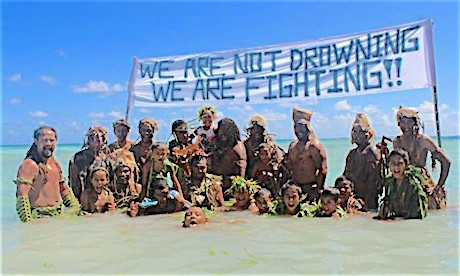Pacific voices have been heard at the Climate Change Conference in Paris, COP21.
“It is through the actions of civil society and small island nations that the agreement recognises we need to keep a global temperature limit well below 2C, and work towards a limit of 1.5C to protect the most vulnerable states,” says Caritas Aotearoa New Zealand Director Julianne Hickey.
Selected as one of only two leaders to represent the 165 member organisations of the Caritas Internationalis confederation, Hickey spoke at an event with other non-governmental organisations on December 7 as part of the conference.
“It’s an honour to be invited to speak at this global event. But more importantly, I am concerned that those most affected by climate change in Oceania have a strong voice at the discussions in Paris. World leaders need to hear about the real life impact of climate change as they make decisions,” Hickey said.
She says the agreement sends a bold signal to the world – to local and national governments, to businesses, to communities and individuals – that we need to cut greenhouse gas emissions as quickly and efficiently as possible.
“At the moment, it offers hope, though not security, for the most vulnerable.”
Caritas is now calling on the international community, especially the affluent and those most able, to redouble their efforts to protect our common home.
“We now need a concrete, robust plan to significantly cut our greenhouse gas emissions, and scale up our own financial assistance to help more vulnerable nations, especially in the Pacific,” Hickey says.
- There is a need to ‘step up’ and look at current carbon emission reduction targets. While it is a small contributor, but it can be much better.
- An 11% reduction on 1990 levels is not good enough.
- It shouldn’t be ‘bought’ through overseas carbon credits.
- Caritas welcomes the commitment to help people in the Pacific move to renewable energy.
- However, there is an urgent need to increase climate change adaptation funding and ensure it reaches those most in need.
- Although it is regrettable that human rights and the rights of indigenous people are not referenced in this agreement, we intend to hold governments to account.
New Zealand’s prime minister John Key told RNZ’s Morning Report that significant steps on emission reduction would not involve cutting back on the mining of oil, gas and coal.
“Not in terms of the production side of the house, if you like … I can’t exactly tell you off the top of my head how many barrels of oil we produce a day but it would be what Saudi Arabia, Iraq and those other countries, Iran, produce in a nano-second. It’s just not large.”
Listen to John Key on Morning Report
Key said New Zealand was just being consistent with what other countries were doing.
“The world’s going to continue to consume some of these products and we can’t stop that.”
“The question is, can we get them to transition more rapidly to other forms of renewable energy? The answer is yes.”
“But one of the fastest ways to do that is to stop the subsidisation of the consumption of fossil fuels and that’s really what the fossil fuel subsidy reform’s about.”
“New Zealand could, of course, just stop producing oil and gas and coal but realistically if we did that I don’t believe it would stop it being consumed. I think the rest of the world would just fill the very small gap we would leave.”
Source
Additional reading- Human rights ‘non-negotiable’ at Paris Climate Conference
- UN Legal Experts Endorse Pacific Positions on Climate Change
- U.S. Government Awards New Grants for Climate Change Adaptation in the Pacific
News category: Asia Pacific, Top Story.




